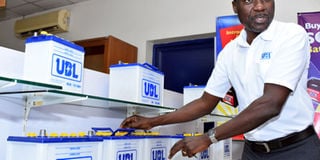Court stops production of Nile Batteries over trademark infringement

Imitating. Mr Zizinga speaks to journalists during a press briefing in Bugolobi, Kampala yesterday. UBL says NBL is imitating its protected features to produce car batteries. PHOTO BY MICHAEL KAKUMIRIZI
What you need to know:
- Confusion. According to court documents, UBL says NBL infringed on its features, which it has been imitating to produce batteries thus causing confusion in the market.
Kampala. Court has halted the production and sale of batteries produced by Nile Batteries Limited (NBL) on claims that they infringe on a trademark registered and owned by Uganda Batteries Limited (UBL).
In a May 3 injunction issued by Justice Anna B Mugyeni, NBL was ordered to stop the production of its batteries until when the main suit is disposed of.
“A temporary injunction does issue restraining the respondent [NBL] from dealing with the batteries marked NBL and Nile Batteries warranty cards in any way including continuing to manufacture, produce, sell and distribute the said batteries and warranty cards, products and material until the disposal of the main suit,” the injunction reads in part.
In February, UBL dragged NBL to court seeking to, among others, temporarily stop the company from manufacturing, selling and distributing its batteries under the NBL brand.
The lawsuit, UBL said in court documents, had been informed by excessive imitation of its battery features by NBL, which had been protected from being used by third parties.
In a statement released by UBL, Mr Moses Zizinga, the company’s director for marketing, said that early this year, they had noted with concern that NBL, which entered the market last year, was imitating its battery features, which had created confusion in the market.
“The product features are identical to those of UBL in design, shape, logo, and sizes which makes it possible for customers to be duped into buying undesired products,” he said in the statement, noting that UBL had been forced to seek court intervention and a temporal injunction had been issued stopping the production of NBL batteries.
“In light of this ... court issued an injunction against NBL. The injunction prohibits NBL from manufacturing, producing, dealing and trading in batteries and products branded NBL as well as using its warranty card,” he said.
In a February 15 letter seen by Daily Monitor, Ms Maria Nyangoma, the Uganda Registration Services Bureau registrar of trademarks, declined to grant Nile Batteries a trademark, noting that the application bore similar features with an already existing trademark, which was bound to cause confusion in the market.
Nile Batteries, which is based in Masese, Jinja District, was among the 10 factories that President Museveni launched early this month.
The company is involved in the production of lead acid automated batteries and officials said during the launch that the company has the capacity to employ 100 workers.
Mr Marvin Mulinde, the UBL head of legal affairs, said during a press briefing in Kampala yesterday that NBL had imitated a number of its features, among them a rectangular-like shape in which the UBL initials are inscribed.
This particularly, he said, is a patented feature for which UBL has exclusive rights yet UBL has infringed on it.
The imitation, Mr Mulinde said, also stretches to design, colour and shape, which makes the UBL and NBL batteries extremely similar.
Mr Francis Baganzi, the NBL public relations officer, yesterday told Daily Monitor they were aware of injunction, noting it was a matter that was being handled as manufacturers.
“It is just a temporary issue that we will soon solve because we are talking at the highest level,” he said.
UBL, which was established in 1967 is the brainchild of the late James Mulwana, a renowned entrepreneur, who died in 2013.
The UBL batteries are certified with the ISO and Uganda National Bureau of Standards quality marks.
Understanding trademark breach
A trademark is a distinctive feature that identifies certain goods or services produced by an individual or a company. It may consist of, among others, a word, symbol, design, slogan, logo, sound or smell.
A trademark has to be distinctive, non-descriptive and not likely to cause confusion.
The trademark owner, according to Uganda Registration Services Bureau, has the exclusive rights to prevent others from infringing on it.




